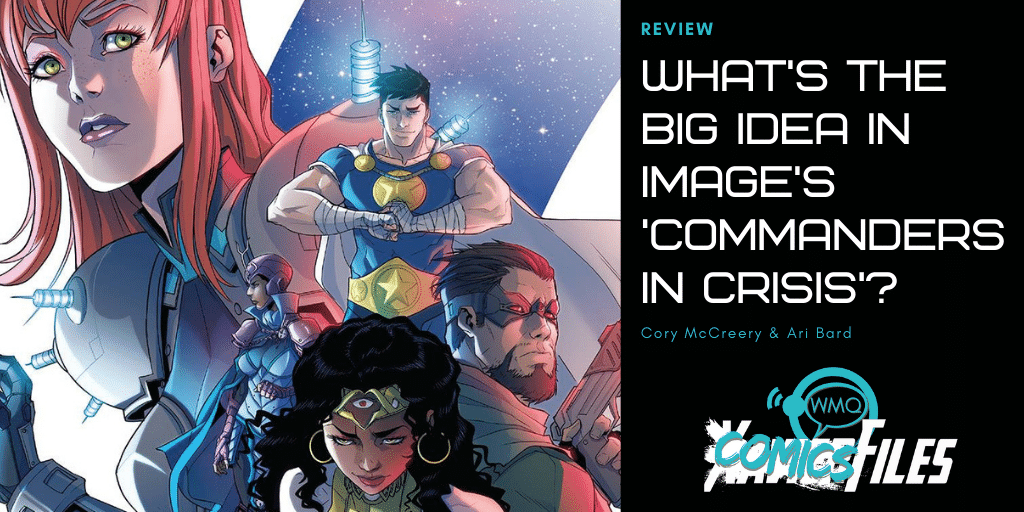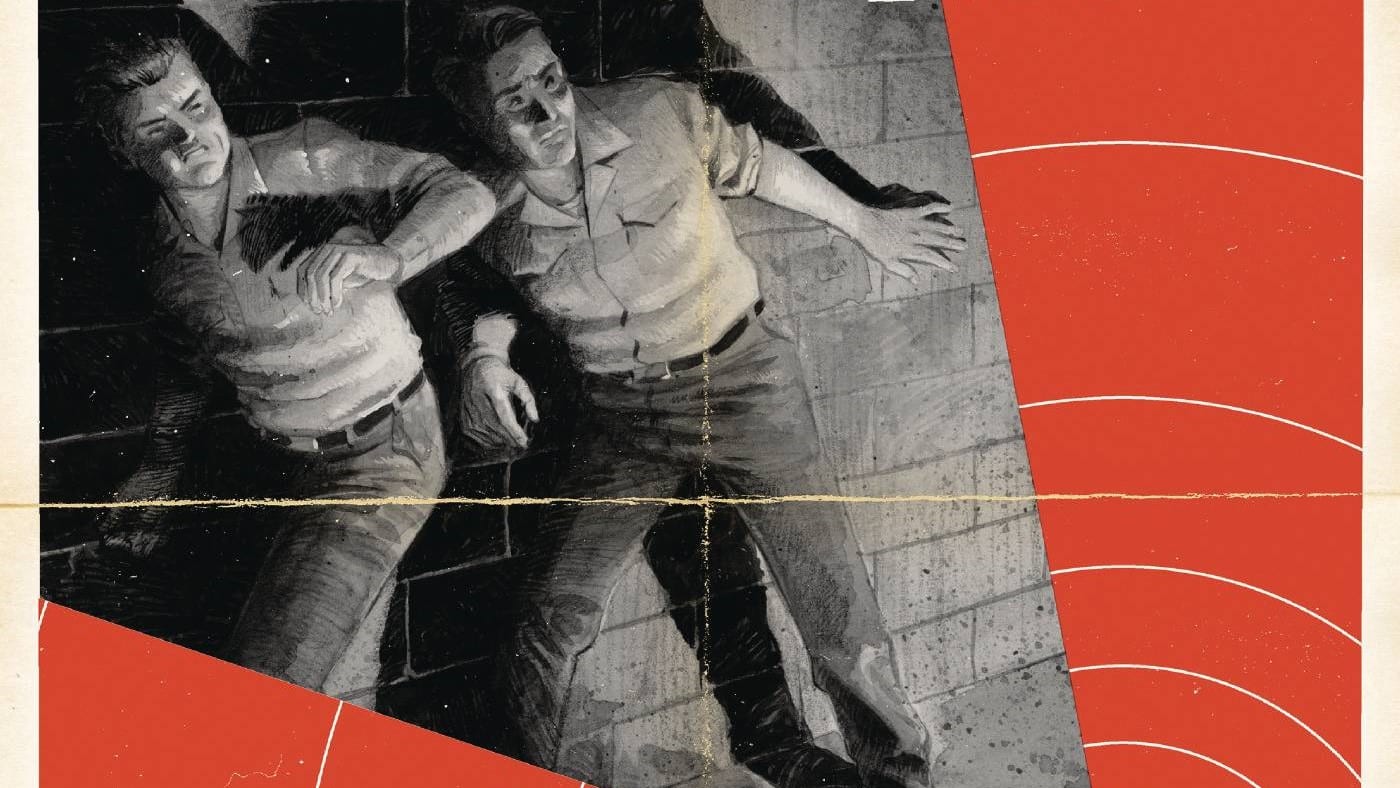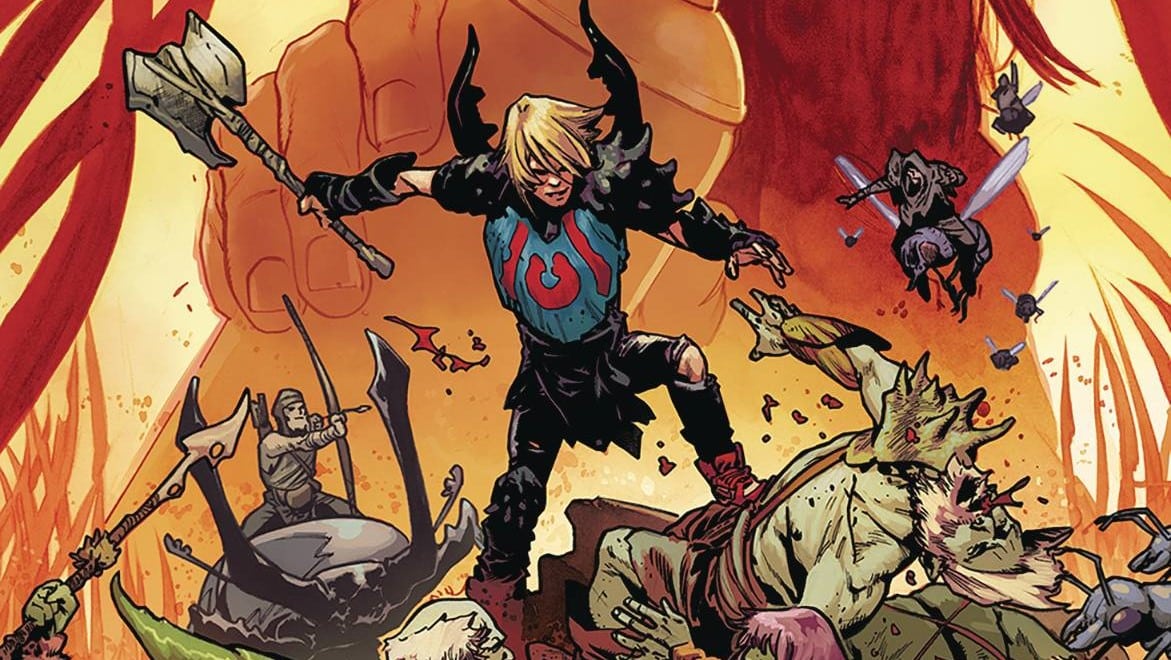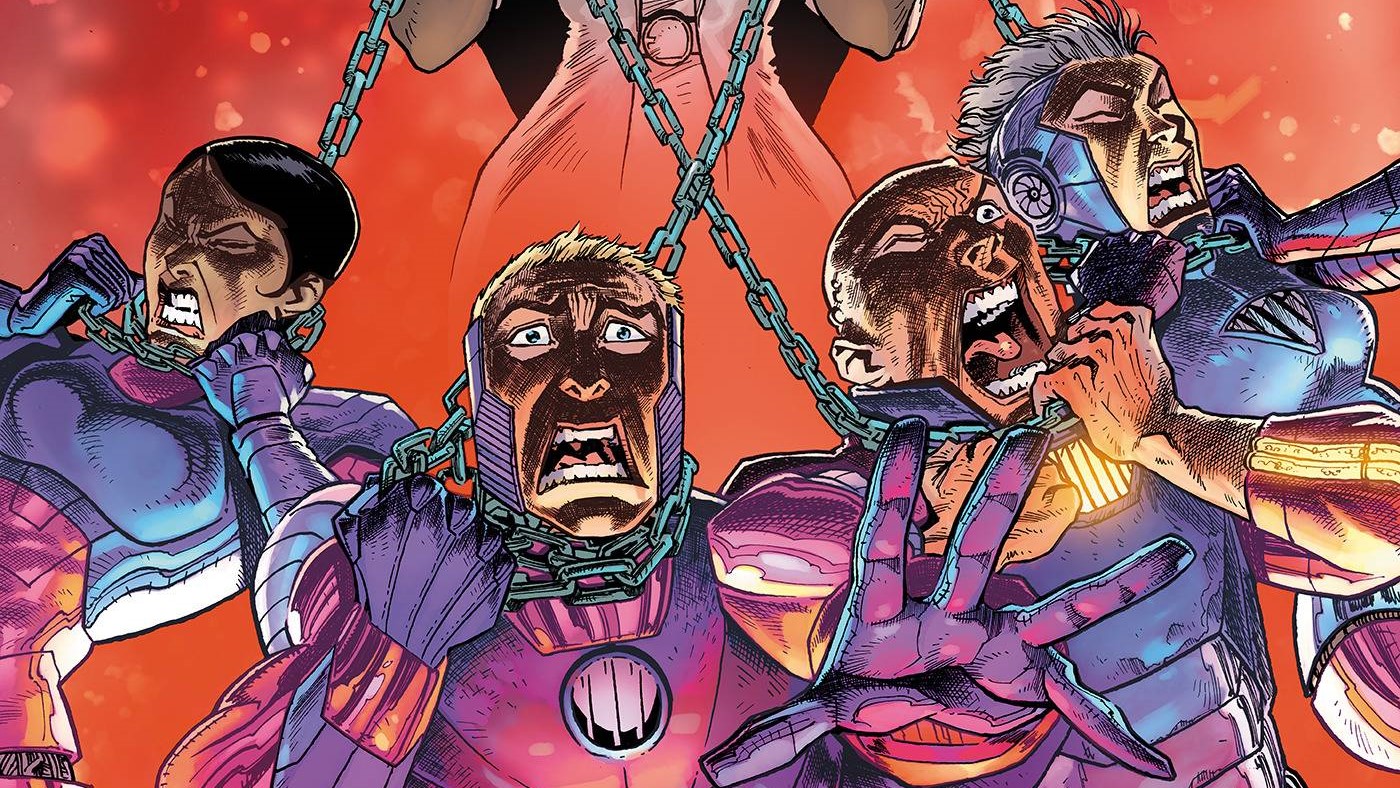Commanders in Crisis #1 is the first issue in a new superhero epic from writer Steve Orlando, artist Davide Tinto, colorist Francesca Carotenuto and letterer Fabio Amelia. Told via a dramatic murder mystery, five survivors of doomed multiverses live as heroes in another, and together, they can save this multiverse before it falls, too. The only catch is that the murder victim is compassion itself.

Cori McCreery: I’ll tell you what, I’ve been HYPE for this series since it was announced. Steve Orlando has been one of my favorite writers at the Distinguished Competition for years, and it’s nice seeing him stretch his wings to other creative outlets. I’m very excited to talk to you about this series, Ari.
Ari Bard: I am equally excited for this series, Cori. Orlando put out some of my favorite series in recent memory at DC, but you can see how limited he was just from the sheer volume of new ideas he’s putting out in the books he’s announced. And that’s before we dive into his thoughts about the superhero genre itself. Commanders in Crisis is rich with commentary about what superheroes can and should be, so let’s get into it!
The Commanders

CM: One of the most impressive things this first issue does is establish a large cast of characters, and do it well. I love this whole team bar none, and they have such interesting power sets. And the team is richly diverse in a way that feels natural, too. I think my favorite though is Prizefighter, the himbo strongman who gets stronger the more people hope for him to be. I’m a sucker for powers being tied to some sort of external thing you can’t control. Also he’s queer and I love that for him. Who is your favorite of the cast?
AB: This is one of the few times where I’m honestly having a lot of trouble picking a favorite. Like you said, the power sets and personalities are all so diverse without feeling out of place, and what strikes me is that the limitations of their powers are just as interesting as the powers themselves. Only being able to use quantum powers for one limit at a time, only having as much strength as the confidence people are able to give you, they are all extremely animated and dynamic limitations that make the powers themselves shine even more. For my favorite though, I’m going to have to go with Originator, a brilliant mind whose words (existing and original), can change reality itself. It creates an idea of quantum linguistics, and, as someone who just can’t inflect and outwardly display emotion very much, but feels very deeply a lot of the time, I definitely relate to the conversation she had at the library. Now, we are given a mere two pages before we’re thrown into the middle of an intense battle. What’d you think about the intensity of this first issue and how we’re introduced to this cast?
In Crisis

CM: Hah, what a nice unintentional segue. (For real, I didn’t have this section named yet when Ari said that). I think the intensity of this book is also part of the draw. Comic fans see the word Crisis and have a certain expectation. We expect bombastic and big, and I think this issue absolutely delivered on that. Things already seem like they’re at the “world’s about to end” point, and it gives the book a sense of urgency we don’t often get in modern superhero books. This book is a fast-paced thrill ride where even the quiet moments feel intense and pressing. And we have a surprising number of those quiet moments, despite being thrown into the action. What did you think of the little moments that let the characters breathe a bit?
AB: I think it was the quiet moments I enjoyed the most, actually, because they gave each character their own chance to shine. We’re able to see who each cast member is outside of the team dynamic. I think it’s the added mystery elements that provide a lot of that breathing room because each hero is trying to figure things out or debrief the situation in their own way. There’s a man dying, for example, but that doesn’t stop Sawbones from being a total ham. The book tends to press forward because a murder needs to be solved and the mystery also needs to breathe. Speaking of murder, let’s talk about the victim its(him?)self: empathy. What do you think about this impetus driving Commanders in Crisis’ narrative?
RIP Empathy

CM: What a concept! This is so meta, and I love it. It feels like a shot across the bow at big comic events of recent years, where we’ve gotten an unending slog of dark and gritty with no hope to be found anywhere. From Metal to Secret Empire to King In Black to Heroes in Crisis, one thing that seems to be missing from all of them is compassion, so it’s a neat idea to see a book acknowledge that. The death of Empathy is the driving force for the destruction of the multiverse, and it’s our heroes’ mission to figure out what went wrong.
AB: I have to agree. There’s a certain lack of depth we’re definitely accustomed to when it comes to big events like this, and I definitely trust Orlando to pull it off. Even when Justice League leading up to Death Metal tried to go abstract with embracing the concepts of doom versus justice, it really fell flat. The idea of the death of empathy, and especially the idea of empathy being manifested as a physical person, is a bit of a red flag to me. I find characters that are meant to be high-powered empaths or characters known for their empathy to often be some of the most emotionally dissonant characters out there for me. Raven, for example, has been one of the most consistently failed characters in the DC universe in my opinion, and that’s because very few writers can conceptually manifest emotion (It’s a very hard thing to do). I hope Orlando is one of the few who can, but I am a tad worried. That being said, ideacide is rad as hell and absolutely a commentary about how to push the superhero genre a step further. Orlando’s able to make it serious without making it dark, and I really appreciate that.
CM: It also feels like Orlando is breaking out all the toys he didn’t get a chance to play with the way he wanted to in his time at DC. This feels like an extension of his Justice League of America run, but a thematic extension rather than a true one. It’s a story he could have told with those characters, but because they aren’t available to him, he’s using his own instead. In a week that also sees the release of Rorschach, that’s saying something important. Sure, the brand names carry weight, but if the story is good, people will read it. After all, Rorschach wasn’t a brand name when Watchmen came out.
I do want to talk a bit about the art, too, because Davide Tinto and Francesca Cartenuto absolutely deliver on dynamic, big and bombastic art. The action sequences we get are beautiful and make you feel like you’re right there in the middle of it. And all of the character designs are absolutely gorgeous AND they’re already distinctive. How did you feel about the art in this issue?
AB: I love the art and how dynamic it is, and I definitely love all of the influences it seems to be drawing from, especially on the manga side of things. Tinto and Cartenuto are definitely playing with backgrounds a lot in this first issue in some really cool ways. It seems as though they asked whether the background is actively contributing to the narrative rather than just being an environment they stay in for the scene’s duration. When we see enough of the wreckage during the big action sequence, Tinto and Cartuno are able to use different techniques with colors and speed lines to better contribute to the feeling of the combat rather than just have another static view of the rubble. I also love that each major cast member has a conscious color palette associated with them and how well they flow into each other. The palette itself takes you on a journey, and that’s pretty rare for a lot of comics.
CM: Yeah, the distinctive look of each character is important, and it’s really just more that’s done to make each of them unique. The last thing I want to touch on is the surprise reveal about their histories. What do you think about their shared trait?
AB: I am not sure that I’ve seen enough to figure out how this affects the team and the series as a whole. Obviously the fact that they are all trail-blazing presidents of various identities means something about what they’ve had to endure, what they’ve achieved and maybe the state of their Americas when they survived the collapse of their multiverses, but I haven’t seen enough yet to really tell how Americentric this book might be or how their role might affect their character. I will say I can see how it might affect the team dynamic. They definitely all seem like leaders who are used to doing things their own way. They handled the crisis together, but separately? It doesn’t seem like they’re quite used to working together or relying on others, and I’m excited to see that evolve. What’d you think?
CM: I think that’s just it, as presidents they are all leaders. They’re not used to being on level footing with others on their same team. And as trailblazers you know that they had to rely on their own strengths a lot more than most. Like you, I’m interested to see how a team of leader archetypes all work together, and how that plays into their egos. I said at the beginning that I was very hyped for this book, and the first issue lived up to my expectations. It was a very strong debut that leaves me very anxious for the next issue.
AB: I can’t help but agree!

Originator’s vocab list:
- Chronodilativepsychodeevolution
- Feminoveloinspirationism







